Can what you eat affect your chance of getting cancer? Yes, it can. Studies show that many cancers can be prevented by changing how we live, and diet is key.
Choosing the right foods can help lower your risk of cancer. By adding certain foods to your diet, you can help keep yourself healthy.
It’s essential to know how diet affects cancer prevention. In this article, we’ll look at foods that can help reduce cancer risk.
Key Takeaways
- Diet plays a significant role in cancer prevention.
- Certain foods can help lower your risk of cancer.
- Making informed dietary choices is crucial for health.
- A proactive approach to diet can protect your health.
- Incorporating the right foods into your diet can make a difference.
The Connection Between Diet and Cancer Risk
The food you eat is key to your cancer risk. More and more research shows that what you eat can affect cancer growth and spread.
How Food Choices Impact Cancer Development
Some foods help cancer grow, while others stop it. Eating too much processed meat and not enough fruits and veggies can raise your risk. Knowing how your food choices affect cancer is vital for prevention.
The Role of Free Radicals and Inflammation
Free radicals and chronic inflammation can lead to cancer. Eating foods that fight these can lower your risk. “A diet full of antioxidants can reduce oxidative stress and inflammation,” says Dr. Jane Smith, a top nutrition expert.
Understanding Antioxidants and Phytochemicals
Antioxidants and phytochemicals are found in many foods, like fruits, veggies, and whole grains. They have been shown to fight cancer.
How These Compounds Fight Cancer at the Cellular Level
At the cell level, antioxidants and phytochemicals fight free radicals and control cell growth. This protection is crucial for lowering cancer risk.
Eating a variety of whole, nutrient-rich foods can help you use antioxidants and phytochemicals for cancer prevention.
Colorful Fruits and Vegetables: Your First Line of Defense
Colourful fruits and vegetables are not just pretty to look at. They are full of nutrients that help lower the risk of cancer. Adding a variety of these foods to your diet is key to a cancer-fighting diet.
Berries and Their Cancer-Fighting Properties
Berries are loaded with antioxidants and phytochemicals that fight cancer. They are among the foods that reduce cancer risk because of their ellagic acid and anthocyanins.
Blueberries, Strawberries, and Blackberries
Blueberries, strawberries, and blackberries are great for fighting cancer. They stop cancer cells from growing and make them die.
Cruciferous Vegetables: Broccoli, Cauliflower, and Kale
Cruciferous veggies have compounds that fight cancer well. They are full of glucosinolates, which turn into sulforaphane and indole-3-carbinol in our bodies.
The Power of Sulforaphane and Indole-3-Carbinol
Sulforaphane and indole-3-carbinol protect cells and stop cancer cells from growing. They are essential for the best diet for cancer prevention.
| Vegetable | Key Compound | Cancer-Fighting Benefit |
|---|---|---|
| Broccoli | Sulforaphane | Inhibits cancer cell growth |
| Cauliflower | Indole-3-carbinol | Protects cells from damage |
| Kale | Both | Enhances cancer prevention |
Tomatoes, Carrots, and Other Colourful Produce
Tomatoes, carrots, and other colourful foods are full of lycopene and beta-carotene. These antioxidants help lower cancer risk.
Lycopene, Beta-Carotene and Their Benefits
Lycopene in tomatoes and beta-carotene in carrots lower the risk of cancer. They are key to a diet that fights cancer.
Eating colourful fruits and vegetables boosts your body’s cancer-fighting power. This is a big part of the best diet for cancer prevention.
Powerful Plant Proteins That Protect
Eating foods rich in plant proteins can help fight cancer. These proteins are found in many foods. They offer benefits that protect against cancer.
Legumes: Beans, Lentils, and Peas
Legumes include beans, lentils, and peas. They are packed with protein, fibre, and phytochemicals. These compounds have been linked to fighting cancer.
How to Incorporate More Legumes Into Your Diet
It’s easy to add legumes to your meals. Try them in soups, stews, and salads. You can also use them as a meat substitute.
Nuts and Seeds for Cancer Prevention
Nuts and seeds are great for healthy fats, protein, and antioxidants. Some have special benefits for preventing cancer.
Walnuts, Flaxseeds, and Chia Seeds
Walnuts, flaxseeds, and chia seeds are known for their anti-cancer properties. They are full of omega-3 fatty acids and antioxidants.
Whole Soy Foods and Their Benefits
Whole soy foods like tofu and tempeh have been eaten for centuries. They are high in protein and isoflavones. These compounds may help fight cancer.
Separating Fact from Fiction About Soy
Despite some debate, research shows whole soy foods are healthy. They can be part of a balanced diet and may protect against some cancers.
| Food | Protein Content | Potential Anti-Cancer Benefits |
|---|---|---|
| Legumes (beans, lentils, peas) | High in protein and fibre | Phytochemicals may reduce cancer risk |
| Nuts and Seeds (walnuts, flaxseeds, chia seeds) | Good source of protein and healthy fats | Rich in antioxidants and omega-3 fatty acids |
| Whole Soy Foods (tofu, tempeh) | High in protein and isoflavones | May offer protective benefits against certain cancers |
Whole Grains and Fibre: Building Blocks for Prevention
Making whole grains and fiber a key part of your diet can lower your cancer risk. These are key parts of a healthy diet that fight cancer.
How Dietary Fibre Reduces Cancer Risk
Dietary fibre is key for a healthy gut. It helps food move through your body, avoiding constipation and reducing the risk of colon cancer. Fibre also dilutes harmful substances in the colon, making them less dangerous.
Soluble vs. Insoluble Fibre Benefits
Dietary fibre comes in two forms: soluble and insoluble. Soluble fibre turns into a gel that lowers cholesterol. Insoluble fibre adds bulk to stool, helping with regular bowel movements. Both are vital for health and cancer prevention.
Best Whole Grain Options for Your Diet
Adding a variety of whole grains to your diet offers many health benefits. Good choices include quinoa, brown rice, oats, and ancient grains like Kamut and spelt.
Quinoa, Brown Rice, Oats, and Ancient Grains
| Whole Grain | Nutritional Benefits |
|---|---|
| Quinoa | High in protein, fibre, and minerals like iron and magnesium |
| Brown Rice | Rich in fibre, manganese, and selenium |
| Oats | High in fibre, with a lot of soluble fibre to lower cholesterol |
| Ancient Grains | Full of fibre, vitamins, and minerals, and often less processed |
Adding these whole grains to your diet boosts fibre intake and lowers cancer risk. Try replacing refined grains with whole grains in your meals for better health.
Foods That May Lower Your Risk of Cancer: The Scientific Evidence
Research shows that some foods can help lower your cancer risk. Diet plays a significant role in cancer prevention. Eating the right foods is key to staying healthy.
Major Research Studies and Their Findings
Many studies have looked into how food affects cancer risk. The American Institute for Cancer Research (AICR) and the World Cancer Research Fund (WCRF) have reviewed extensive research. They found that certain foods can lower cancer risk.
The AICR and World Cancer Research Fund Reports
The AICR and WCRF reports say eating fruits, vegetables, and whole grains can help prevent cancer. They analysed many studies to advise on what to eat to lower cancer risk.
Understanding the Limitations of Food-Cancer Research
Even though the research is promising, it’s essential to know its limits. Studying nutrition is hard because of many variables. These include diet quality, lifestyle, and genetics.
Correlation vs. Causation in Nutritional Studies
One big challenge is determining whether food causes a lower cancer risk. Just because some foods are linked to a lower risk, it doesn’t mean they cause it. More research is needed to confirm.
To make good diet choices, stay informed about new research and talk to doctors. Eating well and living healthy can help lower your cancer risk.
- Eat a variety of colourful fruits and vegetables daily.
- Incorporate whole grains and legumes into your meals.
- Limit processed and red meats.
- Maintain a healthy weight and stay physically active.
By following these tips and staying informed, you can make choices that support your health and well-being.
Herbs, Spices, and Teas With Anti-Cancer Potential
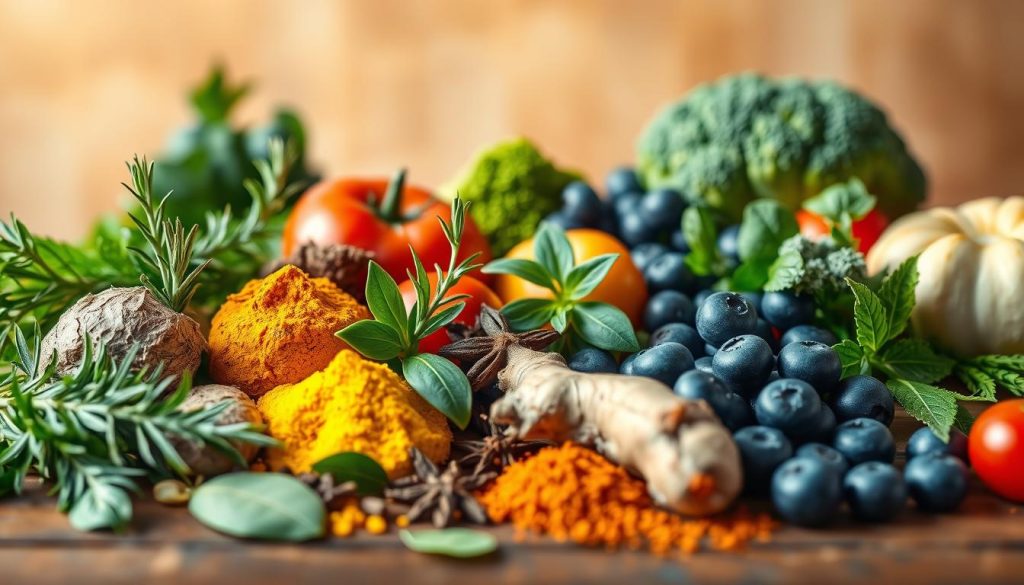
Adding certain herbs, spices, and teas to your meals and drinks can help fight cancer. These natural ingredients not only taste great but may also lower your cancer risk.
Turmeric and Curcumin Benefits
Turmeric, a spice in curry dishes, has a powerful compound called curcumin. Curcumin fights inflammation and has antioxidant properties, which may prevent cancer. Curcumin’s ability to stop cancer cell growth makes turmeric key for a cancer-fighting diet.
How to Enhance Curcumin Absorption
To get the most from curcumin, it’s essential to improve its absorption. Eating turmeric with black pepper boosts curcumin’s effectiveness. Also, adding healthy fats like olive oil to your dishes helps with absorption.
Garlic, Ginger, and Other Protective Spices
Garlic and ginger are spices with anti-cancer properties. Garlic may lower the risk of some cancers, and ginger’s anti-inflammatory effects help prevent cancer.
Daily Usage Recommendations
It’s easy to add these spices to your meals. Use minced garlic in sauces and ginger in stir-fries. Try to include different protective spices in your diet every day.
Green Tea and Cancer Prevention
Green tea is full of catechins, like EGCG, which may fight cancer. Drinking green tea often can lower the risk of some cancers.
The Role of Catechins and EGCG
Catechins, like EGCG, are thought to be behind green tea’s cancer-fighting power. They stop cancer cell growth and cause cell death. Drinking 2-3 cups of green tea a day can help.
| Herb/Spice/Tea | Potential Anti-Cancer Benefit | Usage Tip |
|---|---|---|
| Turmeric | Curcumin inhibits cancer cell growth | Add to curries or mix with black pepper and olive oil |
| Garlic | Compounds may reduce cancer risk | Minced garlic in sauces or roasted |
| Ginger | Anti-inflammatory effects | Use in stir-fries or as a tea |
| Green Tea | Catechins inhibit cancer cell growth | Drink 2-3 cups daily |
Foods to Limit or Avoid for Cancer Prevention
To lower your cancer risk, pay attention to what you eat every day. Some foods protect against cancer, while others may raise your risk. Knowing which foods to avoid is a key step in preventing cancer.
Processed Meats and Cancer Risk
Processed meats like bacon, sausages, and ham are bad for you, says the World Health Organisation (WHO). They found a link between eating these meats and a higher risk of colorectal cancer.
The WHO Classification and Recommendations
The WHO suggests eating less or avoiding processed meats to lower cancer risk. Even a small amount, like 50 grams a day, can increase your risk.
Sugar, Refined Carbohydrates, and Cancer Connection
Eating too much sugar and refined carbs can lead to insulin resistance and inflammation. These conditions are linked to a higher cancer risk. It’s wise to cut down on white bread, sugary snacks, and sweet drinks.
How Sugar Feeds Cancer Growth
Cancer cells need more glucose than normal cells. While sugar doesn’t directly cause cancer, a diet full of it can create conditions that help cancer grow.
Alcohol Consumption Guidelines
Drinking alcohol is a risk factor for cancers like breast, liver, and oesophagal cancer. The more you drink, the higher your risk.
Safe Limits and Cancer Risk Assessment
Men should limit alcohol to two drinks a day, and women to one. But the best way to avoid cancer is to drink as little as possible.
| Food/Drink | Cancer Risk | Recommendation |
|---|---|---|
| Processed Meats | Increased risk of colorectal cancer | Avoid or limit |
| Sugar and Refined Carbohydrates | Linked to insulin resistance and chronic inflammation | Limit sugary foods and refined grains |
| Alcohol | Increases risk of several cancers | Limit to 1-2 drinks per day |
By being careful about what you eat, you can lower your cancer risk. It’s about finding a balance and knowing how your food choices affect your health.
Creating a Cancer-Protective Eating Pattern
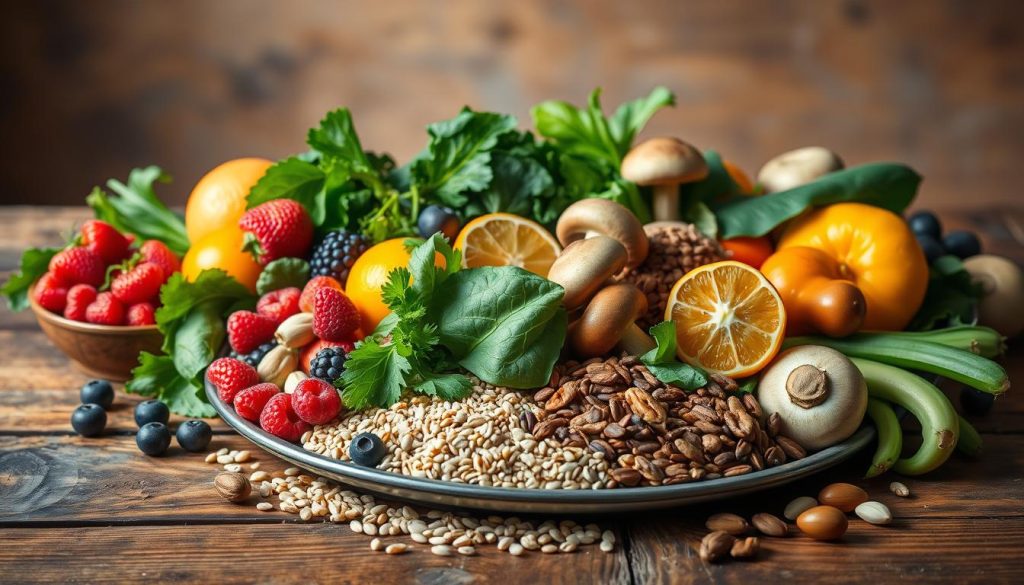
To protect against cancer, make wise food choices. Focus on whole, nutrient-rich foods. This can significantly lower your cancer risk.
The Mediterranean Diet Approach
The Mediterranean diet is known for its health benefits, including fighting cancer. It’s all about eating whole grains, fruits, veggies, and healthy fats like olive oil.
Plant-Based Eating for Cancer Prevention
Mainly eating plants is another great way to prevent cancer. Plant foods are full of fibre, vitamins, and minerals. These nutrients are good for your health.
Practical Meal Planning Tips
To make healthy eating a habit, plan meals around whole foods. Here are some tips to help you:
- Begin your day with a healthy breakfast, like fruits and whole grains.
- Add different colored veggies to your meals.
- Use herbs and spices for flavour instead of salt and sugar.
Sample Weekly Menu for Cancer Prevention
Here’s a weekly menu to show how to add cancer-fighting foods to your diet:
| Day | Breakfast | Lunch | Dinner |
|---|---|---|---|
| Monday | Oatmeal with berries | Grilled chicken salad | Quinoa and vegetable stir-fry |
| Tuesday | Whole grain toast with avocado | Lentil soup | Baked salmon with roasted vegetables |
Beyond Diet: Other Lifestyle Factors That Influence Cancer Risk
Diet is key in fighting cancer, but other lifestyle choices matter too. A holistic approach to health can lower your cancer risk.
Physical Activity and Weight Management
Staying active and at a healthy weight are vital. Exercise helps control hormones, boosts the immune system, and cuts down inflammation. These benefits can lower your cancer risk.
Exercise Recommendations for Cancer Prevention
The American Cancer Society suggests 150 minutes of moderate or 75 minutes of vigorous activity weekly. Adding strength training can boost your health even more.
Stress Reduction and Sleep Quality
Too much stress and poor sleep harm your immune system and raise inflammation. Meditation or yoga can help manage stress and improve your health.
How These Factors Interact With Diet
Eating well, staying active, managing stress, and sleeping well work together. They can greatly reduce your cancer risk.
“Lifestyle factors such as diet, physical activity, and stress management are interconnected and can collectively impact cancer risk.”
Holistically changing your lifestyle can significantly improve your health. It can also lower your cancer risk.
Conclusion: Empowering Yourself Through Food Choices
Adding the right foods to your diet can help lower your cancer risk. The foods we talked about are good for your health and help fight cancer.
Eating colourful fruits, vegetables, whole grains, and plant proteins is key. Berries and cruciferous veggies have special powers against cancer. Making wise food choices helps you control your health.
But diet isn’t the only thing that matters. Exercise, keeping a healthy weight, and managing stress also help prevent cancer. By combining a healthy diet with these habits, you can significantly reduce your cancer risk. Start making these changes today for a healthier life.

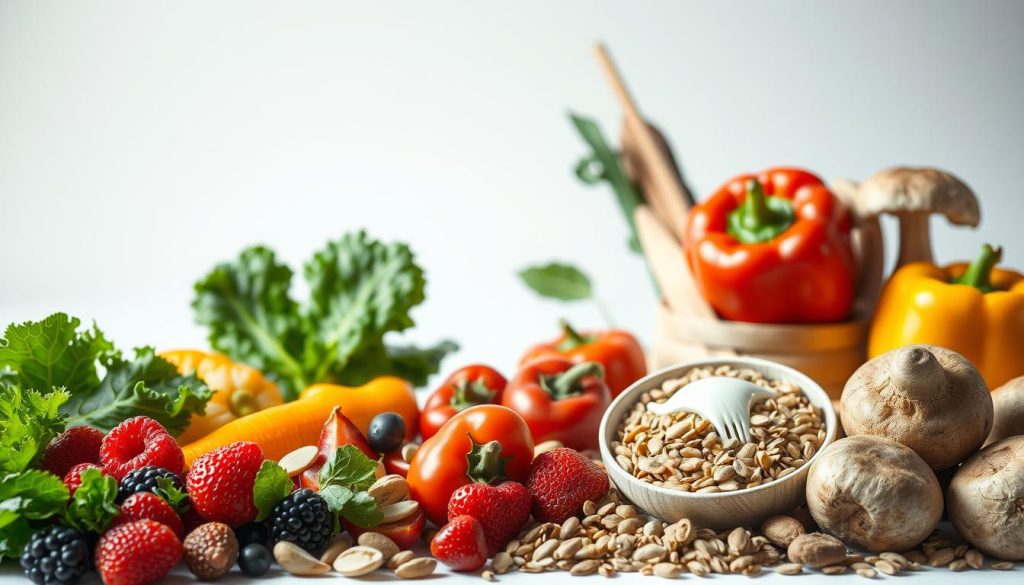

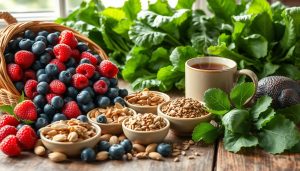
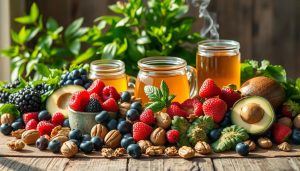
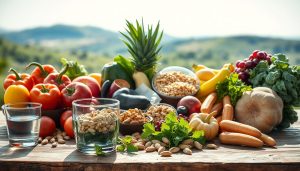


9 thoughts on “Discover the Foods That May Lower Your Cancer Risk”
https://shorturl.fm/ovrxj
https://shorturl.fm/NED1f
https://shorturl.fm/HC637
https://shorturl.fm/nUvbZ
https://shorturl.fm/AVKg2
https://shorturl.fm/vZECJ
https://shorturl.fm/fjGcY
https://shorturl.fm/oiJBa
https://shorturl.fm/1BTVp